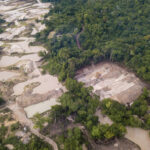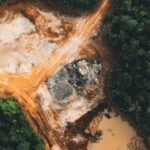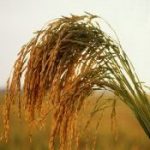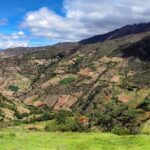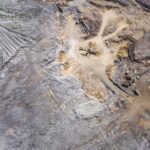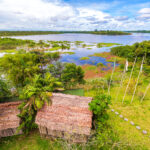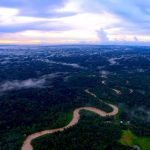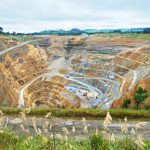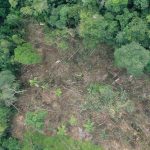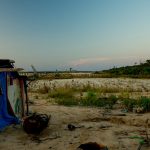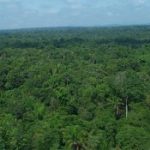
Extractive economies in Latin America, such as mining, fishing, and logging — where legal and illegal activity often intersect — along with crimes like wildlife trafficking and drug production, pose some of the gravest threats to the survival of the region’s ecosystems and the people who defend them. This article examines the main criminal economies driving the degradation of forests, rivers, and oceans across Latin America and the Caribbean: illegal gold mining, drug trafficking and its infrastructure, timber trafficking, land grabbing, illegal/unreported/unregulated fishing, and wildlife tracking
Tren de Guayana, one of Venezuela’s oldest illegal mining groups, allegedly has used ties to President Nicolás Maduro’s administration to push out other criminal groups and solidify its power in the state of Bolívar.
Tren de Guayana began its operations in 2007 as an urban gang in the Vista al Sol neighborhood, in the city of San Félix in Bolívar. In recent years, it has achieved absolute control over El Callao, a mining town located in southern Bolívar known for its gold deposits.
A series of recently published data is shining a new light on patterns of deforestation in the Amazon, revealing where crops, cattle ranching and mining are encroaching on the rainforest.
Some of the crops are well-known drivers of deforestation, such as soy, but lesser-discussed crops are also present in the region, such as rice and sorghum.
llegal settlements and agriculture have pushed into Yacambú National Park in the state of Lara, degrading forests that serve as natural aquifers for multiple cities and towns.
Recent reports from military operations and civil society groups indicate that the presence of Brazilian miners in the south of Venezuela is growing following a government offensive in Brazil. In mid-May, the Venezuelan army dismantled a mining camp allegedly belonging to garimpeiros, or illegal miners from Brazil, in the Alto Orinoco municipality, Amazonas state, according to Domingo Hernández Lares, Strategic Operational Commander of the Venezuelan Armed Forces (CEOFANB).
Civil society organizations have also reported on the operations of garimpeiros in Venezuela. At the end of April, machines belonging to miners invaded the municipality of Rio Negro, located on the southern border of Amazonas state with Brazil, according to SOS Orinoco, an organization dedicated to the study of illegal mining in Venezuela’s Amazon region.
According to Global Canopy, US$6.1 trillion in funding was provided to the 350 companies with the greatest risk exposures to tropical deforestation by some 150 financial institutions in 2023.
Through this exposure, land conversion presents numerous supply-chain risks to firms, namely:
- The reputational risks posed by adverse media (exacerbated further if linked to any human-rights abuses in the context of land conversion).
- The legal risks represented by increasing regulatory and legislative pressures on companies and financial institutions to prevent deforestation.
- The physical risks present, given that most bank-financed businesses and commercial services ultimately depend on natural capital and resources directly or through their supply chains. Aggressive consumption of resources reduces their availability in the long term, undermining sustainable development and creating economic instability. Indeed, the World Economic Forum (WEF) has estimated that at least 50 percent of global GDP is reliant on nature and warned that the impacts of climate change would significantly destabilise global trade.
The growth of gold mining gangs in Peru’s La Libertad province has led to a deteriorating security situation, with unprecedented attacks on security forces and one of the country’s largest mining companies on the rise.
A lack of state presence and a gold rush in La Libertad has caused informal and illegal mining to spike, leading to the rise of the parqueros. With many of the same conditions present in other mining areas, these kinds of attacks may spread.
\The gangs that eventually became known as parqueros emerged alongside an influx of illegal and informal miners across Peru in the last few years. These miners hired private security guards known as chalecos, or jackets. Chalecos protected these miners and helped them settle disputes — often outside the law, either because the miners wanted to avoid security forces’ attention or because there was no security presence to enforce the law. Eventually, the chalecos began to overpower the miners, extorting them or taking control of their territory. They have become increasingly organized, with some experts claiming that gangs from La Libertad’s capital city of Trujillo and even the Venezuelan gang Tren de Aragua have moved into Pataz’s parquero scene.
For the past 11 years, Global Witness has documented and denounced waves of threats, violence and killings of land and environmental defenders across the world, and 2022 marks the beginning of our second decade documenting lethal attacks. The world has changed dramatically since we started documenting these in 2012. But one thing that has not changed is the relentlessness of the killings.
Last year, at least 177 defenders lost their lives for protecting our planet, bringing the total number of killings to 1,910 since 2012. At least 1,390 of these killings took place between the adoption of the Paris Agreement on 12 December 2015 and 31 December 2022.
Amazon nations have attacked in a joint declaration the “proliferation” of environmental rules in trade, echoing a growing backlash against new EU deforestation requirements.
The final document does not single out the European law specifically, but it condemns “the proliferation of unilateral trade measures based on environmental requirements and norms which constitute trade barriers”.
Mongabay has begun publishing a new edition of the book, “A Perfect Storm in the Amazon,” in short installments and in three languages: Spanish, English and Portuguese.
Chronicling the efforts of nine Amazonian countries to curb deforestation, this edition provides an overview of the topics most relevant to the conservation of the region’s biodiversity, ecosystem services and Indigenous cultures, as well as a description of the conventional and sustainable development models that are vying for space within the regional economy.
The Venezuelan government has deployed over 5,000 soldiers in the country’s national parks with the goal of evicting criminal groups leading illegal gold mining and drug trafficking operations.
According to the Operational Strategic Commander of the Bolivarian National Armed Forces, Domingo Hernández Lárez, thousands of litres of fuel, hundreds of engines, rafts, pipes, processing plants, chemical agents, camping gear and other materials are being destroyed on a daily basis during military operations carried out in tandem with the neighbouring Colombian armed forces.
- Multiple recent reports show that deforestation has greatly increased in Venezuela’s Amazonian states of Bolívar and Amazonas, largely due to illegal mining, expanded agriculture and fires.
- Venezuelan protected areas have been especially hard hit, with illegal incursions and major deforestation occurring inside Caura, Canaima and Yapacana national parks.
- Soaring deforestation rates are blamed partly on Colombian guerrillas operating illegally within Venezuela’s borders, an invasion that one report alleges has been supported by the government of Venezuelan President Nicolás Maduro.
- Forest loss has been well confirmed via satellite, while ground truthing has been obtained via firsthand accounts.
We present here the first report of a series focused on the Venezuelan Amazon, which covers over 47 million hectares of the northern section of the Amazon biome (above western Brazil).
As the Amazon Base Map indicates, Venezuela is a key part to the remaining core Amazon that is still functioning as a critical carbon sink, making it an important piece to long-term conservation strategies.
However, deforestation has been increasing in recent years (see graph in Base Map), indicating escalating threats.
- A report from the Political Ecology Observatory of Venezuela (OEP) lays out the worst environmental conflicts that the South American country faced in 2021.
- Among them are oil spills, deforestation, mining, and a lack of clean water in areas with degraded watersheds.
- The report notes the continuing difficulty of tracking environmental parameters in Venezuela, due to the lack of transparency by government at all levels.
- Regardless, it notes that last year’s events contributed to numerous public health crises.
Click here to access the Global Illegal Logging and Associated Trade (ILAT) Risk assessment tool and to download the Forest Trends User Guide describing the functionality of the ILAT Risk Data Tool.
Click here to access the Cattle Data Tool.

